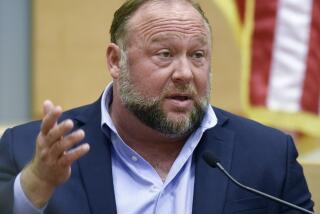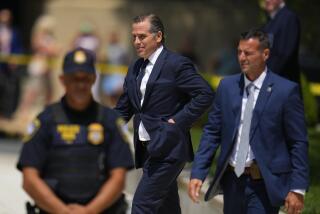Neil Bush Broke Conflict Rules, Official Decides : Thrifts: An administrative law judge says the President’s son failed to disclose his business ties to two big borrowers of a failed Denver thrift.
- Share via
WASHINGTON — An administrative law judge ruled Tuesday that President Bush’s son, Neil, violated conflict-of-interest regulations in the failure of a Denver thrift and recommended that he be restricted in any future roles with financial institutions.
The judge agreed with federal regulators that Neil Bush failed to properly disclose his business relationships with two of the largest borrowers at Silverado Banking, Savings & Loan Assn., where he was a director for three years.
Bush “engaged in unsafe and unsound practices involving multiple conflicts of interests,” said the judge, who works for the Office of Thrift Supervision, which regulates thrifts and brought the civil charges against Bush.
Bush contested the allegations at a hearing in Denver last September, and his attorney said Tuesday that the judge’s decision would be appealed to the director of OTS. If the ruling is upheld, the attorney said he will take the matter to federal appeals court.
“I don’t think it sounds any more logical or rational than when OTS argued it,” said James E. Nesland, Bush’s attorney. “When we go to a real court with real judges, I expect to have a contradictory decision and have it decided on the merits.”
OTS could have sought a ban that would have barred Bush from being involved with a bank or savings institution ever again. But the agency had requested only a so-called cease-and-desist order to restrict Bush’s activities.
Daniel J. Davidson, the administrative law judge, recommended that Bush be required to obtain a lawyer’s advice on potential conflicts if he takes another position at a financial institution. The judge also said Bush should make a full disclosure of his business deals annually and abstain from voting on issues where he has an interest if he joins another institution.
The White House press office said President Bush would have no comment on the judge’s findings. When the allegations first surfaced, the President said he had full faith in his son, but he vowed to stay out of the legal process.
Neil Bush, a Denver oilman, was a director of Silverado from 1985 to 1988. He resigned when his father was nominated to the Republican presidential ticket. Later that year, regulators seized Silverado and declared it insolvent. Its failure is expected to cost the taxpayers $1 billion.
At the center of the allegations against Bush were his relationships with two Colorado developers, Bill L. Walters and Kenneth M. Good. The two developers ultimately defaulted on more than $100 million in loans from Silverado, which helped bring about its collapse, according to regulators.
The regulators charged that Neil Bush failed to disclose adequately to his fellow directors that he had extensive business dealings with the developers at a time that they were receiving loans from Silverado.
According to the charges, Neil Bush violated his duties by voting to approve loans to Walters without disclosing the extent of his business deals with Walters and he personally arranged for Walters to receive a $900,000 line of credit from Silverado.
The regulators also accused Bush of failing to tell his fellow directors that Good was preparing to invest $3 million in Bush’s oil drilling firm at a time Good told Silverado he was broke and could not make his loan payments. Good also loaned Bush $100,000 that was never repaid.
In his ruling, Davidson accepted the agency’s allegations concerning the conflict-of-interest violations and said they constituted unsafe practices.
Rep. Henry B. Gonzalez (D-Tex.), chairman of the House Banking Committee, said in an interview that the administrative judge’s decision seemed appropriate to the actions of Bush, who testified at hearings conducted earlier this year by the committee.
“Frankly, my own opinion is that he was a little minnow swimming with a bunch of barracudas,” said Gonzalez.
Bush and his fellow directors and some former Silverado executives also face a $200-million lawsuit by the Federal Deposit Insurance Corp., which accuses them of gross negligence.
More to Read
Inside the business of entertainment
The Wide Shot brings you news, analysis and insights on everything from streaming wars to production — and what it all means for the future.
You may occasionally receive promotional content from the Los Angeles Times.










